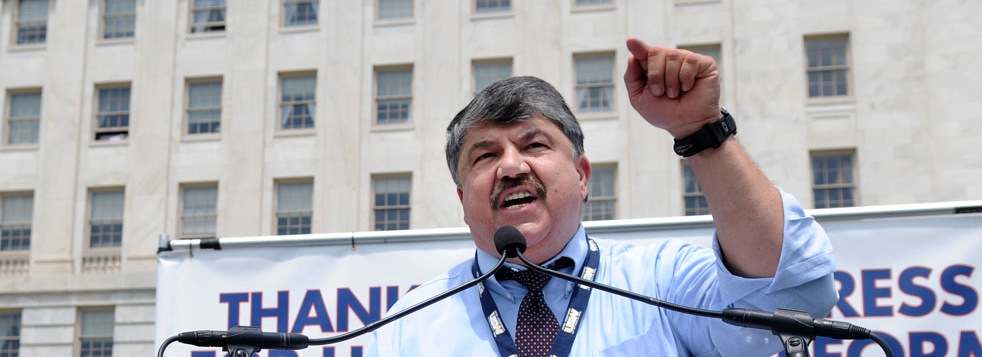(Richard Trumka | Source: Creative Commons)
Sitting in the office of the AFL-CIO president, Richard Trumka, one sees books on labor history, economics, corporate crimes and proposals for change piled up everywhere. Perhaps that helps explain why Mr. Trumka, a former coal miner who became a lawyer, presented his besieged organization’s quadrennial convention in Los Angeles last week with a fiery visionary “big tent” design to develop more alliances with citizen and worker organizations that are not trade unions.
Citing common ground on some public policies, Mr. Trumka wants to strengthen ties with the likes of the NAACP, Working America, the Sierra Club, the Economic Policy Institute, Women’s groups, and the Taxi Drivers, the Domestic Workers Alliance and worker centers. He would like some of these organizations to be brought into the governing bodies of labor unions and the AFL-CIO’s executive council.
|
Frederick Douglass said, “Power concedes nothing without a demand.” That approach, in its specifics, must be directed to President Barack Obama and the Democratic leaders of the House and Senate.
|
The latter was too much for some unions fearful of being diluted or “Trojan horsed,” such as the construction unions that want the XL pipeline to be built regardless of the Sierra Club’s contrary position. However, the resolution approved by the assemblage did endorse Trumka’s open door to advocacy on behalf of temporary workers or non-unionized poverty groups, on a more informal basis.
Eighty-eight percent of all workers are not unionized. Union membership has been declining for more than four decades. The AFL-CIO has known this, but cannot seem to push its member unions to greatly increase their organizing budgets at a time when global companies can easily leave America for China or elsewhere. On the other hand, there are tens of millions of low-income workers in the service sector whose jobs cannot be exported and who want opportunities for unionization.
Trumka has problems in implementing his vision. First, he is not in functional control of his largest member unions. Second, there is surplus labor and there are too few well-paying jobs. Third, he has allegiances to the Democratic Party leaders and President Obama who do not tolerate much public criticisms or rebellion by a weakened labor movement, which they know believes it has nowhere to go in a two-party duopoly.
The more aggressive members of the AFL-CIO are not well received by the larger more cautious counterparts. The fast growing California Nurses Association, and its national affiliate National Nurses United, want Obamacare replaced with single-payer, everybody in, nobody out, under public insurance and private delivery of health care. Single-payer or full Medicare for all, with free choice of physician and hospital, has been supported by a majority of the public, including doctors and nurses, for many years. It is more efficient and humane. Yet, because Trumka et al do not want single payer on the table, the Nurses stayed home and there was no single-payer exhibit permitted at the AFL-CIO Convention.
Yet, Obamacare has angered many established unions with Taft-Hartley healthcare plans. Mr. Trumka now has his hands full with Barack Obama over how these plans are jeopardized by a very complex Obamacare, which he and other labor leaders supported before the blowback occurred.
Will Trumka’s grand inclusiveness work? Paul Tobias, who founded the National Employment Lawyers Association in 1985 to help non-unionized workers with their legal problems, says such outreach can benefit these laborers but “the devil is in the details.” He has seen organized labor talk like this before. The question awaiting an answer is: How many resources/organizers will the Trumka camp put into the alliance and what is the specific agenda?
Clearly Trumka and the AFL-CIO could help many deprived workers. Underpaid workers are rallying in front of Walmarts and McDonalds demanding a living wage and union representation. Others are demanding that President Obama simply issue an executive order requiring federal contractors to pay a living wage to workers who are at the frozen federal minimum wage of $7.25.
The problems with the AFL-CIO and most unions were regularly described by the venerable labor activist, Harry Kelber, who passed away in late March just before his 99th birthday. As you can see by visiting his website, Mr. Kelber wrote scores of articles about the bureaucratization of smug labor leaders and their failure to stand up to the big employers and the Democratic Party.
With eighty years in the labor movement, Mr. Kelber was running for the presidency of the AFL-CIO just to give one alternative, however symbolic, to the AFL-CIO delegates. Under AFL-CIO rules, losing candidates get 15 minutes to speak before the Convention. Harry Kelber undoubtedly would have called on them to recover their nerve, lead by example, be more democratic, fight for single-payer health insurance, work to repeal the notoriously anti-labor Taft-Hartley Act, and above all tap union treasuries to hire many more organizers to expand union protection for tens of millions of powerless workers who can’t pay for the necessities of life.
Richard Trumka dismissed Harry Kelber and others who have criticized him from the progressive Left. Too bad he doesn’t apply his book learning to fearlessly advance the labor agenda, starting with abolitionist Frederick Douglass’ famous phrase “power concedes nothing without a demand.” That approach, in its specifics, must be directed to Barack Obama, the Democratic leaders of the House and Senate and the corporate barons who are paid $10,000 per hour and have been bringing workers to their knees while pouring campaign money into the indentured Democratic Party’s coffers.
Workers understand the difference between their unions’ political rhetoric and independent political action for their future.
Ralph Nader is a consumer advocate, lawyer, author and five-time candidate for president. His most recent book is Told You So: The Big Book of Weekly Columns.







0 Comments